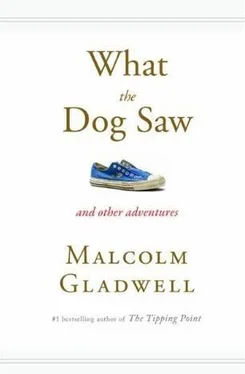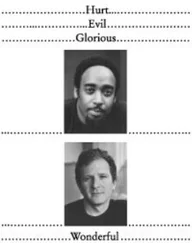When Ballmer and Partovi and I met Nolan Myers, we made a prediction. We looked at the way he behaved in our presence—at the way he talked and acted and seemed to think—and drew conclusions about how he would behave in other situations. I had decided, remember, that Myers was the kind of person you called the night before the big test in seventh grade. Was I right to make that kind of generalization?
This is a question that social psychologists have looked at closely. In the late 1920s, in a famous study, the psychologist Theodore Newcomb analyzed extroversion among adolescent boys at a summer camp. He found that how talkative a boy was in one setting—say, at lunch—was highly predictive of how talkative that boy would be in the same setting in the future. A boy who was curious at lunch on Monday was likely to be curious at lunch on Tuesday. But his behavior in one setting told you almost nothing about how he would behave in a different setting: from how someone behaved at lunch, you couldn’t predict how he would behave during, say, afternoon playtime. In a more recent study, of conscientiousness among students at Carleton College, the researchers Walter Mischel, Neil Lutsky, and Philip K. Peake showed that how neat a student’s assignments were or how punctual he was told you almost nothing about how often he attended class or how neat his room or his personal appearance was. How we behave at any one time, evidently, has less to do with some immutable inner compass than with the particulars of our situation.
This conclusion, obviously, is at odds with our intuition. Most of the time, we assume that people display the same character traits in different situations. We habitually underestimate the large role that context plays in people’s behavior. In the Newcomb summer-camp experiment, for example, the results showing how little consistency there was from one setting to another in talkativeness, curiosity, and gregariousness were tabulated from observations made and recorded by camp counselors on the spot. But when, at the end of the summer, those same counselors were asked to give their final impressions of the kids, they remembered the children’s behavior as being highly consistent.
“The basis of the illusion is that we are somehow confident that we are getting what is there, that we are able to read off a person’s disposition,” Richard Nisbett, a psychologist at the University of Michigan, says. “When you have an interview with someone and have an hour with them, you don’t conceptualize that as taking a sample of a person’s behavior, let alone a possibly biased sample, which is what it is. What you think is that you are seeing a hologram, a small and fuzzy image but still the whole person.”
Then Nisbett mentioned his frequent collaborator, Lee Ross, who teaches psychology at Stanford. “There was one term when he was teaching statistics and one term when he was teaching a course with a lot of humanistic psychology. He gets his teacher evaluations. The first referred to him as cold, rigid, remote, finicky, and uptight. And the second described this wonderful warmhearted guy who was so deeply concerned with questions of community and getting students to grow. It was Jekyll and Hyde. In both cases, the students thought they were seeing the real Lee Ross.”
Psychologists call this tendency—to fixate on supposedly stable character traits and overlook the influence of context—the Fundamental Attribution Error, and if you combine this error with what we know about snap judgments, the interview becomes an even more problematic encounter. Not only had I let my first impressions color the information I gathered about Myers, but I had also assumed that the way he behaved with me in an interview setting was indicative of the way he would always behave. It isn’t that the interview is useless; what I learned about Myers—that he and I get along well—is something I could never have gotten from a résumé or by talking to his references. It’s just that our conversation turns out to have been less useful, and potentially more misleading, than I had supposed. That most basic of human rituals—the conversation with a stranger—turns out to be a minefield.
Not long after I met with Nolan Myers, I talked with a human-resources consultant from Pasadena named Justin Menkes. Menkes’s job is to figure out how to extract meaning from face-to-face encounters, and with that in mind he agreed to spend an hour interviewing me the way he thinks interviewing ought to be done. It felt, going in, not unlike a visit to a shrink, except that instead of having months, if not years, to work things out, Menkes was set upon stripping away my secrets in one session. Consider, he told me, a commonly asked question like “Describe a few situations in which your work was criticized. How did you handle the criticism?” The problem, Menkes said, is that it’s much too obvious what the interviewee is supposed to say. “There was a situation where I was working on a project, and I didn’t do as well as I could have,” he said, adopting a mock-sincere singsong. “My boss gave me some constructive criticism. And I redid the project. It hurt. Yet we worked it out.” The same is true of the question “What would your friends say about you?”—to which the correct answer (preferably preceded by a pause, as if to suggest that it had never dawned on you that someone would ask such a question) is “My guess is that they would call me a people person—either that or a hard worker.”
Myers and I had talked about obvious questions, too. “What is your greatest weakness?” I asked him. He answered, “I tried to work on a project my freshman year, a children’s festival. I was trying to start a festival as a benefit here in Boston. And I had a number of guys working with me. I started getting concerned with the scope of the project we were working on—how much responsibility we had, getting things done. I really put the brakes on, but in retrospect I really think we could have done it and done a great job.”
Then Myers grinned and said, as an aside, “Do I truly think that is a fault? Honestly, no.” And, of course, he’s right. All I’d really asked him was whether he could describe a personal strength as if it were a weakness, and in answering as he did, he had merely demonstrated his knowledge of the unwritten rules of the interview.
But, Menkes said, what if those questions were rephrased so that the answers weren’t obvious? For example: “At your weekly team meetings, your boss unexpectedly begins aggressively critiquing your performance on a current project. What do you do?”
I felt a twinge of anxiety. What would I do? I remembered a terrible boss I’d had years ago. “I’d probably be upset,” I said. “But I doubt I’d say anything. I’d probably just walk away.” Menkes gave no indication whether he was concerned or pleased by that answer. He simply pointed out that another person might well have said something like “I’d go and see my boss later in private, and confront him about why he embarrassed me in front of my team.” I was saying that I would probably handle criticism—even inappropriate criticism—from a superior with stoicism; in the second case, the applicant was saying he or she would adopt a more confrontational style. Or, at least, we were telling the interviewer that the workplace demands either stoicism or confrontation—and to Menkes these are revealing and pertinent pieces of information.
Menkes moved on to another area—handling stress. A typical question in this area is something like “Tell me about a time when you had to do several things at once. How did you handle the situation? How did you decide what to do first?” Menkes says this is also too easy. “I just had to be very organized,” he began again in his mock-sincere singsong. “I had to multitask. I had to prioritize and delegate appropriately. I checked in frequently with my boss.” Here’s how Menkes rephrased it: “You’re in a situation where you have two very important responsibilities that both have a deadline that is impossible to meet. You cannot accomplish both. How do you handle that situation?”
Читать дальше











